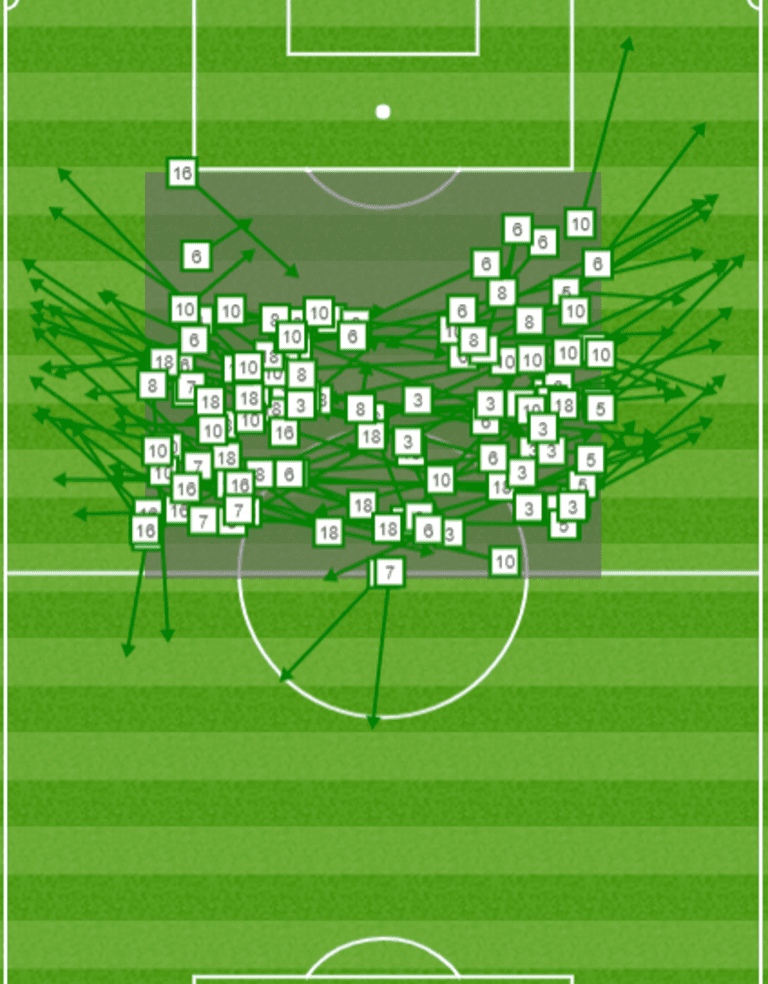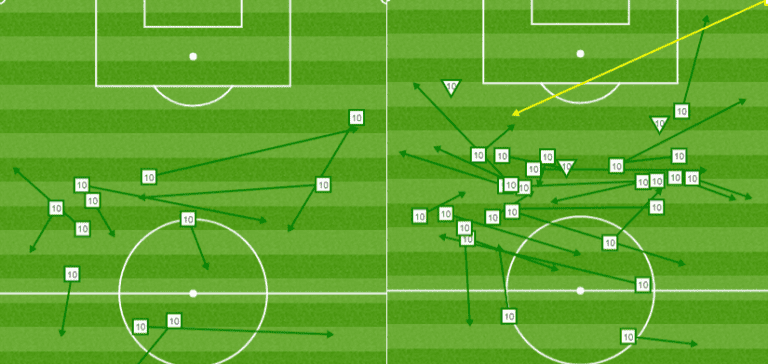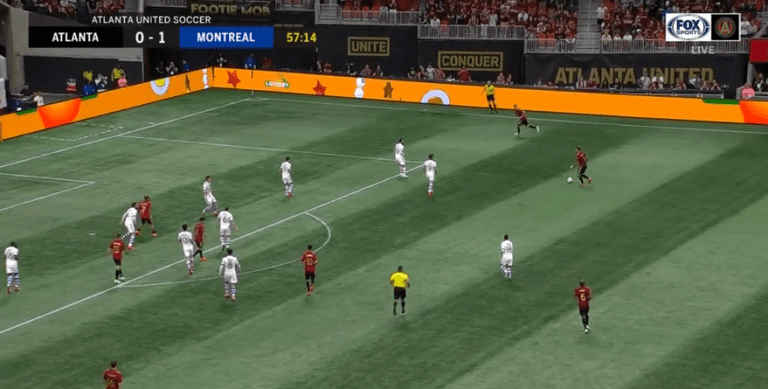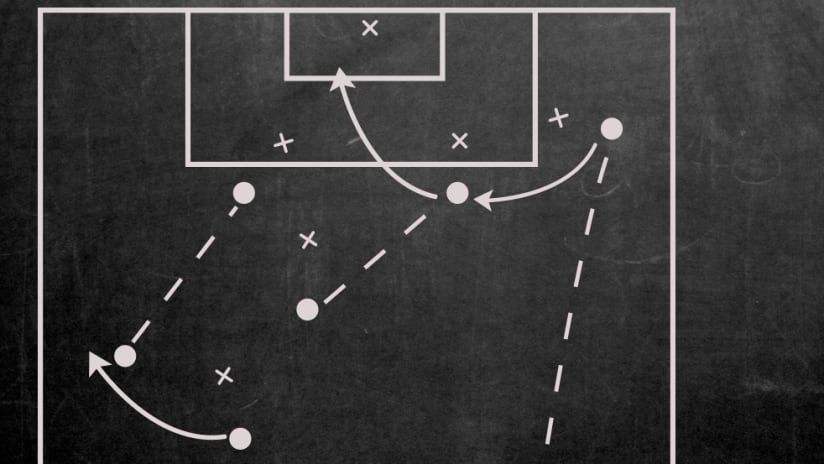When the Montreal Impact visited Atlanta United on Saturday afternoon, Atlanta ended up 4-1 winners. The scoreline suggests the Five Stripes had a routine day at home, but the game played out differently: Atlanta had to work for their win, and not just with the ball at their feet.
The game developed into a tactical chess match, each team making slight adjustments in response to the other over the course of 90 competitive minutes.
Kickoff
Montreal made the first move of the game, assuming a defensive posture to open the game.
It appeared Remi Garde set a clear gameplan: line up in a 4-5-1, restrict Atlanta’s attacking space, limit the home side’s chances near goal and catch opportunities on the counter – particularly in the wide channels, since Atlanta play a 3-5-2 with attacking wing backs.
The Impact started from the first whistle in an extremely compact, middle-to-low block. Whenever Atlanta had the ball, Montreal retreated to their own end, starting their pressure with Nacho Piatti as the lone striker around the bottom of their own center circle. Montreal kept 10-to-12 yards between each of their vertical lines – Piatti to the midfielders, and then the midfielders to the defenders – and about 10 yards between players side-to-side, ensuring the lines of four or five stayed within the width of the 18-yard box. It was an overly compact setup to ensure Atlanta couldn’t play between the Impact lines; Montreal overcompensated in the middle to push Atlanta outside the defensive block.
On Saturday, Matt Doyle called it a bunker, but Montreal didn’t start the game at the top of their box and stay there. This was a smart, compact approach to prioritize restricting space rather than getting pressure on the ball, limiting the space behind the defenders. Sure, Montreal got pushed back later in the game (more to come there), but the way they opened is just what good defensive shape should often look like.
2nd Minute
Atlanta followed Montreal’s lead and played the ball to the open space in the wide channels. Atlanta can usually find gaps through the middle, even when teams hope to take them away, but Montreal did an excellent job at pushing Atlanta wide.
As we can see from the picture below that depicts Atlanta’s first-half passes in the middle of the field, they rarely (never?) made central passes forward. Their their passes form a U-curve that goes around Montreal’s block.

Atlanta’s most dangerous actions came from Julian Gressel crosses, including a perfect service to Josef Martinez in the 4th minute that the Venezuelan failed to capitalize on. For the most part, though, the first 20 minutes were slow and predictable.
15th minute
A big part of attacking a compact defense is seeing whether they are actually willing to do the work. It looks easy to stay in a tight defensive block, but it’s mentally and physically exhausting: constantly running five yards back-and-forth, checking for runners, staying on your toes, physically and intellectually active at every second. Positioned that far back, one mistake – as small as being three yards out of position – can lead to a goal. A lot of teams say they want to defend like that, but the players just aren’t up for it.
The early stages of attacking against a team that plays as defensively as Montreal did often involve probing and feeling out the opponent. Atlanta looked like they were going side-to-side and unable to break Montreal down, but it’s all part of the testing phase.
When Atlanta didn’t pose any real problems, Montreal held their position in the defensive half.
19th Minute
Miguel Almiron changes his positioning and movement. Instead of helping to facilitate the ball’s movement around Montreal, he started to make darting runs off-the-ball through Montreal’s lines, specifically to the left attacking channel.
It changed the game in two ways:
- It got Almiron on the ball in more dangerous positions – behind and between Montreal instead of in front of them.
- It pulled Montreal’s defenders out of their designated zones.
Here you can see the increase in volume and variation of Almiron's touches as the first half progressed:

20th minute
The Impact might actually have started in a 4-1-4-1, but if they did, it only distinguished itself from a 4-5-1 around the 20th minute. The tight block started to separate, whether because of intent, that being a long time to stay perfectly focused and disciplined, or simply Almiron’s movement forcing the change. Samuel Piette, who had stayed relatively stationary in the middle of Montreal’s five-man midfield, began to run more, even as the other midfielders continued to play the same way. Piette was tasked with putting out sparks before they became fires, either through clogging lanes when teammates weren’t in the right position or by tracking Almiron’s runs forward.
Halftime: ATL 0, MTL 1
Recognizing that Montreal wouldn’t be offering much offensive threat, Atlanta manager Tata Martino subbed out defensive midfielder Jeff Larentowicz and inserted attacker Tito Villalba. Villalba went straight to striker, Ezequiel Barco moved back to attacking mid, and Darlington Nagbe dropped to the base of the midfield.
Early in the game, Atlanta United play-by-play announcer Kevin Egan noted that VP & technical director Carlos Bocanegra recognized in the offseason that teams would arrive to Mercedes-Benz Stadium and sit deep, and Atlanta needed players to break it down. To respond, Bocanegra went out and acquired Nagbe and Barco. The halftime switches emphasized this, creating opportunities to get two dynamic passers and dribblers on the ball as often as possible to continue to mount the pressure.
These could seem like obvious choices, but they carried risk for Martino.
Larentowicz’s main task on Atlanta United is to protect against counter attacks. As Almiron, Gressel, Barco and the rest wheel and deal, Larentowicz provides the cover. Without Larentowicz on the field, Atlanta became more susceptible to the one way Montreal hoped to score: a counter.
55th Minute
As the second half progressed, Montreal was pushed deeper and deeper. Instead of having their block between midfield and the 18, it got pushed toward their box.
This seemed unplanned, simply a natural consequence of human reaction. When teams – people – get put under pressure, they often want to limit risk; in soccer, to do so means limiting the space behind the defenders. The natural action when you’re under pressure is to drop deeper. Nobody designates it, it just happens. Montreal kept everything the same in their tight 4-1-4-1, but fell farther back.

For the first time in the game, the move was forced rather than planned. And Atlanta got their first goal.
Nagbe received the ball in front of Montreal’s defensive block and picked up his head. In the first half, this would have taken place near the center circle. In the second half, it occurred 30 yards from goal. A chipped pass from Nagbe put Chris McCann 10 yards from goal. McCann headed the ball into the hand of Montreal’s Chris Duvall. Almiron put it home.
74th minute
It wasn’t a Montreal bunker by design to start the game, but it turned into a bunker by the end. Montreal sat atop their own 18, completely denying space in and around the box.
Bringing Kevin Kratz on for Greg Garza created two key changes for Atlanta:
- It moved Almiron to the left, away from the mess in the middle of the field.
- It provided Atlanta a unique threat on set pieces, which became more important facing a bunker.
In the 78th minute, Kratz buried a gorgeous bender from the top of the box. Once Atlanta took the lead and Montreal were forced to leave their defensive posture, it opened up the possibility of Atlanta piling on. Almiron and Kratz each added one more, with Kratz’s coming from another free kick.
Final: ATL 4, MTL 1
The game ended 4-1, but it felt far from a blowout. Montreal did a lot right: They had a clear gameplan and executed it well, for the majority of the game. Atlanta ultimately won the game on a penalty and incredible free kick. Whether those were inevitable or unfortunate depends on how you see the game. I’m guessing Montreal walked away thinking the latter.
Martino and his players had to work for everything, both with the ball and through their brains. The Five Stripes stayed patient and made the proper adjustments for the situation. It’s the rare occasion when both teams truly deserve credit, regardless of the winning margin.













